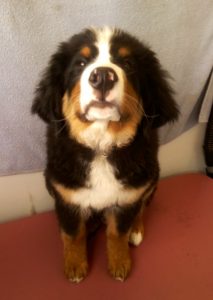Why Does My Dog Constantly Lick His Paws?
 Does the sound of your dog constantly licking or chewing her paws in the middle of the night drive you crazy? Is the licking causing sores, skin infections, or hair loss on her feet? Excessive, consistent paw licking and chewing is a sign of an underlying problem that will need to be treated before you can alleviate the obsessive behavior.
Does the sound of your dog constantly licking or chewing her paws in the middle of the night drive you crazy? Is the licking causing sores, skin infections, or hair loss on her feet? Excessive, consistent paw licking and chewing is a sign of an underlying problem that will need to be treated before you can alleviate the obsessive behavior.
The Most Common Reasons for Paw Licking
There are a number of possibilities for why your dog is constantly licking his paws. For example, it could be due to:
Allergies – Your dog’s paws are often the first place you’ll notice her becoming itchy if your pup has atopy (an inflammatory reaction to air-borne pollens) or food allergies. Grass pollens can cause her particular discomfort if she brings them into the house on her feet.
Disease – Pesky fleas, fungal infections, and mange mites cause an insistent burning itch if they burrow around the pads of your dog’s feet and in between the toes. Additionally, dogs with chronic arthritis and diabetes often suffer from bone pain and nerve damage in their paws, and will chew and lick to alleviate the ache.
Injury – Broken nails, fractured toes, split and cracked pads, or even a foreign body stuck in a paw pad will cause your pooch to lick at the injured area to ease the pain and begin the healing process.
Habit or boredom – Restless animals will do almost anything to relieve their boredom, and with some dogs, that includes excessive chewing and licking on their paws. For high-energy dogs who need a ton of exercise, licking their feet can become a soothing habit.
Anxiety – Without consistency in a daily routing, a sensitive dog can become anxious and upset. A new family member, a new pet, a change in the diet or meal times – all of these circumstances can push some dogs into anxiety and they will comfort themselves by licking their paws.
Obsessive/compulsive disorder – Like their human owners, some dogs develop a psychological disorder of the obsessive- compulsive type that compels them to constantly lick their paws. Some veterinary behaviorists suggest that the licking releases endorphins – opiate-like chemicals – from the dog’s brain that produces a sense of well-being and calmness during times of stress or anxiety that can become addictive.
Paw Licking Can Be a Problem
Besides the annoyance of hearing your pooch lick and chew on her feet constantly, other health issues can arise from this canine habit. Skin damage, including open sores called “hot spots,” hair loss, and bacterial skin infections are some of the results from paw licking. When the damaged skin becomes irritated and painful, a cycle of chewing, licking, and causing even more harm can lead to further compulsive behavior.
 See Your Veterinarian
See Your Veterinarian
If your dog is one of those compulsive paw-lickers, you’ll want to see your veterinarian to determine the underlying cause of the problem, particularly if open sores are starting to develop. Your pooch may need hypoallergenic food, antibiotics or other medicines for any disease issues, and your vet may even recommend placing your pet on anti-anxiety meds to help alleviate the problem.
